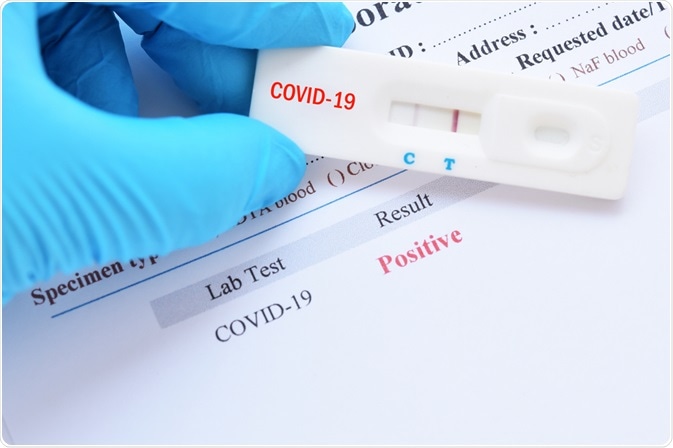A reagent is an integral part of any chemical reaction. A reagent is a substance or compound that can facilitate a reaction, and they are used in most widely used tests. This includes, for example, pregnancy tests, blood glucose tests, and most COVID-19 test kits.

Image Credit: Jarun Ontakrai/Shutterstock.com
Reagents in chemistry
Reagents trigger chemical reactions. This term encompasses organic substances that trigger naturally occurring chains of reactions in the body but also include inorganic substances that can be used in artificially triggered reactions. Reagents are commonly used to test for the presence of certain substances, as the binding of reagents to the substance or other related substances triggers certain reactions.
While sometimes used interchangeably with the term “reactant”, reagents and reactants are quite different. In a chemical reaction, a reagent binds to something and thus triggers a reaction. It is not consumed during this. However, a reactant is consumed. A reactant is a substrate in a reaction, whereas a reagent is a catalyst.
Regents can also be limiting. Limiting reagents stop a chemical reaction when they are used up. The chemical reaction relies on the reagent to continue the reaction and stops when there is no more substance. The limiting reagents, therefore, dictate when a certain chemical reaction does not continue.
Reagents are commonly used in laboratory settings for various tests. For example, Collins reagent is used to convert alcohols to aldehydes and ketones. As such, it can be useful to oxidize acid-sensitive compounds. Fenton’s reagent, similarly, is used in oxidation. However, Fenton’s reagent catalyzes the oxidation of contaminants in water and can be used to eliminate toxic compounds, such as tetrachloroethylene.
Reagents are often used to indicate the presence of compounds by triggering changes in colors to indicate presence. For example, Fehling’s reagent can indicate whether carbohydrates or ketones are present and differentiate between the two functional groups. Millon’s reagent can be used to indicate the presence of proteins. The presence of proteins, as inferred by the presence of tyrosine residues, causes the solution to which Millon’s reagent has been added to turn reddish-brown.
Reagent kits and how they are used
Reagents, such as the ones mentioned above, are commonly used in laboratory or field settings to detect the presence of a range of substances. For example, one of the widespread uses of reagents in everyday life is to test for illegal drugs. While most kits, such as those used to test for common drugs, are easy to use and involve noticing whether there is a color change, other kits are more complicated and require laboratory equipment, such as chromatography.
Mandelin reagent kits are commonly used to test for alkaloids. This means the kit can turn dark green if the drug amphetamine is present, and cocaine causes the color to become deep orange. Similarly, Marquis reagent kits can detect the drug LSD by turning olive black when the drug is present in a solution. Marquis reagent kits can also test for methamphetamine and a range of other drugs.
Reagents during COVID-19 testing
There are two principal methods by which COVID-19 testing is done: antibody testing and PCR-based testing. Both of these rely on reagents to successfully test for COVID-19 infections.
In antibody testing, the compound being detected in the reagent testing kit is the antibody to the COVID-19 virus. In these cases, the blood of the patient is tested with enzymes as the reagents. The test reagents bind antibodies, such as IgG and IgM, and if they are present a line will indicate this on the testing kit. These tests are quick to carry out and can indicate the previous infection of the virus.
PCR, or polymerase chain reaction, tests whether the genetic material of the COVID-19 virus is present in the blood. Using real-time reverse transcription PCR (RT-PCR), the reagents used are enzymes to detect the specific genetic material, which is highly unique to the virus. This is a more complicated form of the reagent test kit, as it requires chromatography techniques.
Lateral flow device (LFD) tests have been developed for COVID-19 later on in the pandemic, to provide rapid and widescale testing, for example in schools. They detect antigens
However, as with other forms of reagents, the ones used for testing of COVID-19 are limited and prone to issues in production and trade. In a pandemic setting, especially, this has become an issue, as previously laboratories and producers operated at a much lower capacity compared to the current need and a shortage of reagents has not been encountered before on the same scale. There are different reagents used to extract the virus or viral materials, others to amplify this, and then other reagents to test for their presence.
References
- Bell-Young, L., 2020. What Is A Reagent? [online] ReAgent Chemical Services. Available at: <https://www.reagent.co.uk/what-is-a-reagent/> [Accessed 28 September 2020].
- Esbin, M., Whitney, O., Chong, S., Maurer, A., Darzacq, X. and Tjian, R., 2020. Overcoming the bottleneck to widespread testing: a rapid review of nucleic acid testing approaches for COVID-19 detection. RNA, 26(7), pp. 771-783.
- Heil, A., 2020. What's A 'Reagent' And Why Is It Delaying Expanded Coronavirus Testing? [online] Radio Free Europe Radio Liberty. Available at: <https://www.rferl.org/a/coronavirus-reagent-delaying-expanded-coronavirus-testing-/30563198.html> [Accessed 28 September 2020].
Further Reading
Last Updated: Mar 12, 2021